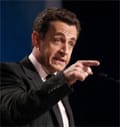Nicolas Sarkozy turned his appearance in the Azurean territory into a rightward shift in his campaign. He focused his attacks on the left and its candidate Ségolène Royal, sparing UDF candidate François Bayrou. He placed morality at the center of everything: “For the first time in thirty years, it is morality, not management, that is at the heart of politics. For the first time in 30 years, morality is being talked about in a political campaign […] It emerges from the electoral debate that France is not faced with a mere crisis of morals, but a real moral crisis. We measure its depth when we see that merely discussing national identity can provoke hysteria among a part of the political class, in certain intellectual circles, in the media… That national identity has become so much of a vulgarity for so many people who nevertheless have a responsibility in society, so many people who claim to belong to an elite, for so many people who think they are entitled to lecture everyone, this is what I call the symptoms of a serious moral crisis.” In addition to morality, he urges the French to make a choice on April 22 between “those who no longer want to hear about the Nation and those whom I am with who demand that the French Nation be respected, those who love France and those who display hatred of France [.. .] those who are attached to national identity and want to defend it and those who think that France has so little existence that it doesn’t even have an identity.”
Discussing the history of France and its dark colonial times, he reminded that not all colonizers were exploiters. On the same theme, he praised all the French who helped Jews and Jewish children during the occupation. He narrated the universal values advocated by France at all times: secularism, human rights, gender equality. His old conviction resurfaced then: “Those who do not want these values are not welcome on the territory of the French Republic. I say to those who do not consider their wife as their equal, to all those who want to impose a husband on their daughter, to all the big brothers who want to impose an outfit on their sister, to all those who want to keep their wife at home, to those who are polygamous, that these are values incompatible with the values of the French Republic.” He continued by demanding mastery of the French language.
Nicolas Sarkozy offensive against the moral bankruptcy of the left.
He used the riots at Gare du Nord to directly attack the left: “I find it unworthy of a presidential candidate to side with those who violate the law. My conviction is that a responsible politician is always on the side of the victims and a man who sides with the offenders is irresponsible. Always defending the fraudster. Always finding excuses for those who respect nothing. This is what I call the moral bankruptcy of a certain left.” He is surprised that François Bayrou and Ségolène Royal make a hero out of the fraudster. The “Just Order,” the socialist candidate’s slogan, is undermined. He mocks: “Stop telling me just order! The just order is when those who want neither to study nor to work have the right to loot a store to get sports shoes without having to pay for them. The just order, when put to the test of facts, is just disorder and at the end of the disorder, the just order is always injustice.”
Education, like his two main opponents, holds an important place. First, Nicolas Sarkozy wishes to hold families accountable with sanctions (family allowances placed under guardianship) if they let their minor children commit crimes and provide help to families in need. Another measure announced: the care after 4 PM by the school through supervised studies of children left to themselves after school. This measure is extended in a wish or a vow: “I wish that the teachers, the professors are not only teachers but also educators.” The values of work and instilling them throughout schooling are paramount: “I want to tell the truth to the youth. I want to tell them that work is freedom, it is equal opportunity, respect, dignity, real citizenship.” He concludes his speech with a series of decisions: six-month civic service, a Marshall plan to offer training leading to a job for all the young people in the suburbs, training allowance subject to diligent pursuit of training and success in exams, obligation to perform an activity in exchange for minimum income, not to refuse more than twice a job corresponding to one’s training.
Three weeks before the first round, the UMP candidate refocused his speech on morality and national identity. He has been aggressive, far from his last peaceful televised appearances. He made the 8,000 or 10,000 or 12,000 supporters present in the Nikaïa hall stand up as one.


